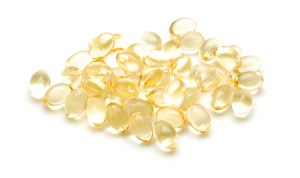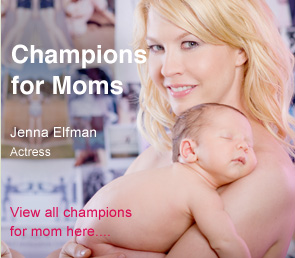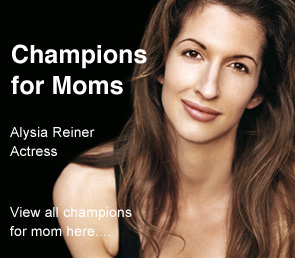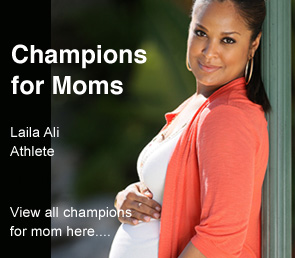 Some of you may have heard about a recent meta-analysis published in Pediatrics which found that formula supplemented with long-chain polyunsaturated fatty acids (such as DHA) did not have a measurable effect on infants’ cognitive development.
Some of you may have heard about a recent meta-analysis published in Pediatrics which found that formula supplemented with long-chain polyunsaturated fatty acids (such as DHA) did not have a measurable effect on infants’ cognitive development.
This is consistent with another large meta-analysis published last year which looked at physical growth and vision in addition to cognitive development.
And another interesting study just out compared levels of DHA in breastmilk in U.S. mothers with that of mothers in Amazonian Bolivia (who eat a diet high in fish), finding that these women had DHA levels 400 times higher than their U.S. counterparts. It also found that levels of DHA remained steady over the course of two years of lactation - a crucial period of infant brain development.
It’s clear that long-chain polyunsaturated fatty acids like DHA are important to infant development, and breastmilk supplies plenty of them. They’re also important for mothers’ physical and psychological health, protecting us from postpartum depression.
So if they’re so important, how do you know if you’re getting enough while breastfeeding? Should all moms take supplements? Are we doing this for the baby or for our own health, or both?*
To answer these questions I turned to Dr. Kathleen Kendall-Tackett. Dr. Kendall-Tackett is a health psychologist, board certified lactation consultant, and Clinical Associate Professor of Pediatrics. She has authored more than 300 articles and 21 books on maternal depression, family violence and breastfeeding, including Depression in New Mothers and Breastfeeding Made Simple.
Some of her research has focused on the role of omega-3 fatty acids for the prevention and treatment of postpartum depression. You can listen to podcast interviews I did with her on two related topics of interest: Omega-3s and postpartum depression during breastfeeding, and anti-depressant use for nursing moms.
Is there a recommended amount of DHA/EPA a breastfeeding mother should have, through diet or supplementation? In other words, is there agreement in the medical community about maternal needs, and if not, is there an amount you think is justifiable from the evidence?
The current guidelines for DHA (200 mg/day) are, in my opinion, too low and will eventually change. For prevention [of postpartum depression], mothers should take approximately 500-750 mg EPA and 800-1000 mg DHA per day. I would say that 200 mg is the absolute minimum, and it all helps.
I base my recommendation on a recent study I summarized in an article of Journal of Midwifery and Women’s Health. The researcher found that in order to prevent depression, a woman would need to have a certain level of DHA in their red blood cells. In order to achieve that, they would have to consume 800-1000 mg of DHA. The reason this figure struck me was because in cultures where women eat a lot of fish and have low rates of depression, the amount they consume is 800-1000 mg a day.
Unfortunately, I don’t think there is consensus in the medical community about this-yet. But the science is definitely there.
Is the idea of maternal supplementation with DHA/EPA about replenishing the mother’s stores for her physical and psychological health (because her stores are depleted by their mobilization for the baby’s milk), or is it about ensuring that there is enough in milk for the baby?
I think the main issue is that we don’t want mothers deficient in these fatty acids. It will be better for both their mental and physical health if they are not. And any stores that she has will go to the baby, so she gets more depleted with each pregnancy.
DHA/EPA levels are reflected in the milk. The more in the mother’s system, the higher the levels in her milk. But they really don’t have an impact on her milk production.
Does this vary by mother depending upon her stores?
Yes. The main goal is ensuring that mothers, and therefore babies, are not deficient. But we need to be realistic about what that will accomplish. It will help the babies achieve their potential. It will not turn them into super-smart uber-babies. I think that’s where a lot of the confusion (and hype) about this issue lies.
For more information, Dr. Kendall-Tackett shares:
- Long-chain omega-3 fatty acids and women’s mental health in the perinatal period
- Can Fats Make You Happy?
*A note to mothers who, after reading this, are worried that they’ve done something wrong if they haven’t taken omega-3 supplements during breastfeeding: You’ve clearly done the right thing by breastfeeding, whether you took supplements or not. Your body drew down your stores of fatty acids for your baby, and as the studies at the top of this post indicate, feeding your baby formula (even supplemented with DHA) wouldn’t have provided the same benefits as your milk. You did good, Babe!
Did you take omega-3 supplements during breastfeeding? Did you know that they can prevent and treat postpartum depression?
















I did not with my son. However, while I was trying to conceive this current one (due in January) it was recommended to me by my naturopath to significantly increase my Vitamin D3 and Omega-3 (by way of salmon oil). At my last midwife appointment, she too was very pleased to hear how I was emphasizing Omega-3s in my diet this time around - even in pregnancy for mood and building those good-fat stores for my milk later and encouraged me to continue to take them through pregnancy and lactation (particularly because I can’t eat fish).
I’ve been taking Bioglan fish oil pills while breastfeeding. This article prompted me to see how much EPA/DHA was in each of those pills.
Contains:
Eicosapentaenoic acid (EPA) 165mg
Docosahexaenoic acid (DHA) 110mg
Far less then I thought and recommended. Could you recommend a brand that has that amount in the formulation and if possible, no fishy after taste? Thanks!
Dr. Kendall-Tackett has some recommendations in her handouts - see the links at the bottom of the post. Hope that helps!
Hi Tanya, can’t locate the recommendations. Pls post here if possible? Thank you.
Sorry it took me so long to post this! Here you go:
http://www.breastfeedingmadesimple.com/can_fats_make_you_happy.pdf
Tanya
Nordic Naturals has a high concentration of DHA it has a great strawberry flavor. You can find it at your local health food store or online.
Does Dr. Kendall-Tachett make a distinction between the effectiveness of plant based v. fish-based DHA?
Hi Christina,
Here’s Dr. Kendall-Tackett’s discussion of this from a Science and Sensibility post:
(http://www.scienceandsensibility.org/?author=75)
She also discussed this in a podcast interview I did with her a few years ago on the topic: http://breastfeeding.blog.motherwear.com/2008/02/podcast-breastf.html
Hope that helps!
Tanya
Here are Dr. Kendall-Tackett’s recommendations for vegetarian sources (see Sources of Contaminant-Free DHA): http://www.uppitysciencechick.com/can_fats_make_you_happy.pdf
Hi there, curious about this study! I find it interesting that a mom supplementing does increase their dha but a baby receiving dha through formula has no effect. How is this possible?
Thank you
Pingback: Oh Omega! | We are BUB: